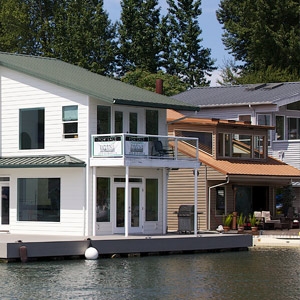Man Overboard! An Unexpected Experience
 Man Overboard: An Unexpected Experience
Man Overboard: An Unexpected Experience
It happened on the Columbia River, as it passes through Oregon. During a recent evening race, with the wind gusting to 20 knots, three people racing a Cal 20 faced a man overboard incident. Here is their debrief…
After racing thousands of offshore miles and likely more than a thousand races on the Columbia River, Mexico, Canada, Hawaii, Bora Bora and in Puget Sound over 30+ years, I fell off a boat for the first time. Why? How? Who cares? Here are the lessons I learned:
♦ It happens in an instant no matter how experienced you are.
♦ WEAR A LIFE JACKET. Without a life jacket on, it very well could have been a different result given the conditions. I’m a good swimmer. Still, with the waves and the current, I just don’t know if I could have kept my head above water for as long as it took to get me out. As I recall (and it’s a bit of a blur), there were at least two unsuccessful boat passes. That takes time. I was grateful for being able to lean back and let the jacket keep my head up. Even so, I swallowed a lot of water. WEAR A LIFE JACKET.
♦ No matter what you think it will be like when you are in the water, the truth is that you are totally helpless and are completely dependent upon your boat or the other boats in the fleet to get to you. You cannot swim or otherwise help the process other than to keep your head above water, stay calm, save your strength, and wait. It feels like forever waiting for the MOB process to get moving.
♦ Without a line to throw to me, the first two passes by rescue boats that were very close to me felt like they were a mile away, and they ended up just wasting time. HAVE A THROW BAG (or at least a long line) HANDY ON DECK. Even with somewhere near 100 years of sailing between the three of us, we never considered having a line ready on deck to throw to someone who we would be rescuing. One crew had to go below to get an extra sheet to throw to me. Seconds matter. A throw bag can be tucked away somewhere handy and not underfoot. We always do it offshore, why not inshore for evening races? Duh! Do it.
♦ LEARN TO MANEUVER YOUR BOAT, with or without headsail, so that you can approach from windward very slowly. Passing by the person in the water happens quickly even at a slow speed and each pass takes time and leaves the person in the water that much more susceptible to problems from cold water, waves and other boats. Coming in from windward, at least in this case, created a slick and protected me from the waves. Both boats did an excellent job maneuvering, though the other passed to leeward of me. It was going very slow and got very close, but the breeze pushed them away from me and without a line to throw, I could only watch the boat drift away.
♦ HAVE SOME METHOD TO GET BACK ON THE BOAT. From the water level, even the short topside of the Cal 20 looks like the side of a barn. I grabbed the line my crew threw me, got pulled alongside, reached up and grabbed the mainsheet turning block on the gunnel and then, with one person holding the shoulders of my life jacket, we began figuring out how to get me aboard. In the words of “Captain Obvious”, it’s a bit late for that. Also, without a life jacket on, I don’t know how they would have held on to me. Just saying.
I finally got pulled around to the back of the boat and climbed on to the outboard motor mount, which beat me up pretty good. Without the motor mount as a seat and stepping stone to get pulled/climb aboard, I know I could not have pulled myself aboard, and the guys onboard would have had a tough time pulling my behind out of the water from the side of the boat. We’re going to have some kind of stowable ladder before the next race.
♦ One of the crew never took his eyes off me. In the water, whenever I looked over at the boat, he was eyeballing me. It helped me stay calm, and it made sure the helmsman knew where I was at all times as he maneuvered the boat.
♦ THINK ABOUT ALL THIS IN ADVANCE, PREPARE, AND PRACTICE. It is no time to learn about what to do, or what you have at your disposal to solve the problem when someone is already in the water. It’s too late. Seconds matter. Think ahead. This is where all of our years of sailing and doing MOB drills and attending Safety at Sea seminars and, well, having talked about it and practiced before paid off. Newbies take note. Old salts… you don’t get a pass just cuz your beard is grey.
♦ WEAR A LIFE JACKET. Even though I was wet and cold and took a bunch of good-natured ribbing from fleet members after the race and did a lot of self-deprecating jokes about it all at the watering hole with a cocktail in my hand, walking into my house and seeing my lovely wife of 37 years was sobering when I thought of the alternative. THIS SITUATION IS NO JOKE. WEAR A LIFE JACKET. ‘Nuff said.
I am reposting this important story about water safety. As a sailor, this information is critical even if it is not exactly related to real estate. But, the way I look at it, you may not be available to buy a house if you fell off the boat without your life jacket. I am guilty! Until now, I only wore my life jacket in rough seas. kld
– See more at: http://www.sailingscuttlebutt.com/2015/06/29/man-overboard-an-unexpected-experience/#prettyPhoto








